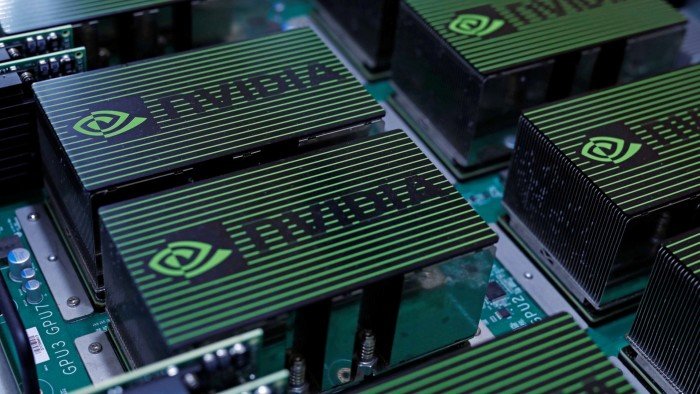Unlock the White House Watch newsletter for free
Your guide to what the 2024 US election means for Washington and the world
Nvidia has said it expects to take a $5.5bn blow after the US clamped down on its ability to export artificial intelligence chips to China, sending the Silicon Valley behemoth’s shares sliding in after-hours trading.
The group said in a regulatory filing late on Tuesday that the H20 chip, which is tailored for the Chinese market to comply with export controls that already prevent the sale of its most powerful chips in China, will now require a special licence to sell to customers there.
Nvidia said that the US had said the move was necessary to address the risk of H20 ships being used in “a supercomputer in China”.
The chipmaker said it would take a $5.5bn charge in the quarter to April 27 related to H20 chips. Its shares fell 6 per cent in after-hours trading on Tuesday, while futures tracking the tech-focused Nasdaq 100 index declined more than 1 per cent.
Washington’s crackdown on H20 chips is the latest example of how the US is using tariffs and other trade barriers to increase pressure on Beijing. President Donald Trump has already increased tariffs on Chinese imports to 145 per cent, although some consumer electronics have received a temporary reprieve.
White House press secretary Karoline Leavitt on Tuesday urged China to cut a new trade deal with the US, saying, “the ball is in China’s court”.
The US’s move also underscores how the chip designer at the heart of the AI boom, which saw unchecked growth over the course of last year and briefly became the world’s most valuable company, is exposed to geopolitical tensions between Washington and Beijing.
On Monday Trump’s administration launched a national security probe that could lead to new tariffs on semiconductors, as it holds off from immediately applying steeper levies on chips.
The restrictions come despite Nvidia chief executive Jensen Huang joining other tech executives in seeking to court Trump. Huang recently dined with Trump at his Mar-a-Lago resort, and also met the president at the White House in January.
Nvidia also said on Monday it would spend up to half a trillion dollars on US AI infrastructure over the next four years through partnerships with companies including Taiwan’s TSMC and Foxconn. The Financial Times had first reported on its investment plans.
The company introduced its China-focused H20 chip last year after the Biden administration imposed export controls on its chips.
They are less powerful than its top range of graphics processing units, or GPUs, coveted by the likes of Microsoft, OpenAI, Google and Amazon.
Despite its reduced performance, the H20 has still seen solid demand in China. But Beijing has meanwhile taken steps to encourage local tech companies to use homegrown chips from companies such as Huawei, and could freeze out Nvidia’s products with new energy efficiency rules.
Nvidia’s shares are down about 16 per cent since the start of the year, as of Tuesday’s close, as anxieties mount about the growing arms race between the US and China around the infrastructure that powers AI. They have also been swept into a broader market rout sparked by the escalating trade war.
The rollout of Nvidia’s newest AI chips has hit stumbling blocks as successive US administrations have sought ways to control the export of the technology.
Former president Joe Biden introduced sweeping restrictions on chip-related technology that included measures aimed at Nvidia over concerns that its chips would make it easier for China to modernise its military.
Since he took office, Trump has unveiled a range of measures that suggest he intends to continue the push to put pressure on China to make it harder for its military to take advantage of American technology.
The US is worried that China will be more successful building supercomputers, which can be used for everything from the development of hypersonic weapons to modelling for nuclear weapons, to help the People’s Liberation Army.
China has repeatedly accused the US of using national security tools, such as export controls, to throttle its economic development. The Chinese embassy in Washington and the White House have been contacted for comment.
An “AI diffusion” rule, introduced in the last days of the Biden administration, is set to come into force in May unless the Trump administration decides to unwind it. It would impose far stricter controls on where the most powerful US chips can be exported to, using a “tiered” licensing system that caps exports for all but a small number of countries.
Last week Republican senators wrote to commerce secretary Howard Lutnick asking the administration to scrap the rule, which has faced pushback across the industry, including from Nvidia.
